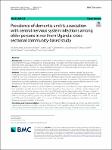| dc.contributor.author | Benyumiza, Deo | |
| dc.contributor.author | Kumakech, Edward | |
| dc.contributor.author | Gutu, Jastine | |
| dc.contributor.author | Banihani, Jude | |
| dc.contributor.author | Mandap, Joshua | |
| dc.contributor.author | Talib, Zohray M | |
| dc.contributor.author | Wakida, Edith K | |
| dc.contributor.author | Maling, Samuel | |
| dc.contributor.author | Obua, Celestino | |
| dc.date.accessioned | 2023-09-12T09:14:44Z | |
| dc.date.available | 2023-09-12T09:14:44Z | |
| dc.date.issued | 2023 | |
| dc.identifier.citation | Benyumiza, D., Kumakech, E., Gutu, J., Banihani, J., Mandap, J., Talib, Z.M., Wakida, E.K., Maling, S., and Obua, C. (2023). Prevalence of dementia and its association with central nervous system infections among older persons in northern Uganda: cross-sectional community-based study. BMC Geriatrics | en_US |
| dc.identifier.uri | https://doi.org/10.1186/s12877-023-04174-9 | |
| dc.identifier.uri | http://ir.lirauni.ac.ug/xmlui/handle/123456789/748 | |
| dc.description.abstract | Background Dementia is a condition in which there is deterioration in cognitive function beyond what might be
expected from the usual consequence of biological aging. Few studies have been conducted on the prevalence of
dementia and its association with central nervous system (CNS) infections among older persons in African settings,
particularly in Uganda. Therefore, this study assessed the prevalence of dementia and its association with CNS
infections among older persons in Lira District, northern Uganda.
Methods This was a cross-sectional community-based study in Lira district northern Uganda. The study was
conducted in March 2022 among 434 older persons aged 50 and above years who were selected by multistage
sampling. Data were collected using an interviewer-administered questionnaire supplemented with information from
participant’s medical records and a brief community screening instrument for dementia. The instrument classifies
dementia into unlikely, probable or possible dementia. Data were entered in duplicate into EpiData version 3.0, then
transferred to Statistical Package for Social Sciences (SPSS) version 23 for statistical analysis.
Results Our study found almost one in four (23%) of the older persons in Lira district northern Uganda were suffering
from probable or possible dementia. Our study further found that older persons in Lira district northern Uganda with
a positive history of central nervous system infections (CNS) had nearly five times higher odds of having probable or
possible dementia compared to their counterparts (cOR: 4.5; 2.76–7.23; p≤0.001). Being in advanced age of 70+years
(aOR: 2.6; 1.6–4.3; p≤0.001), positive history of CNS infection particularly Herpes simplex virus-1 (aOR: 5.4; 1.4–20.5;
p=0.013), and chronic headache (aOR: 1.9; 1.1–3.1; p=0.019) were independent predictors of probable or possible
dementia among participants in this study.
Conclusion and recommendations Dementia is a common condition among older persons in Lira district northern
Uganda with a prevalence of 23% in our study. Older persons with a positive history of CNS infection had higher odd
of developing dementia compared to their counterparts. Having advanced age, cerebral malaria, Herpes simplex virus −1 (HSV-1) infections, and chronic headache were independent predictors for dementia. These results imply that
health assessment for the risk of dementia should include screening for history of CNS conditions particularly cerebral
malaria, HSV-1 and chronic headache.
Keywords Dementia, Older persons, Central Nervous System infections, Northern Uganda | en_US |
| dc.language.iso | en | en_US |
| dc.publisher | BMC Geriatrics | en_US |
| dc.subject | Dementia | en_US |
| dc.subject | Older persons | en_US |
| dc.subject | Central Nervous System infections | en_US |
| dc.subject | Northern Uganda | en_US |
| dc.title | Prevalence of dementia and its association with central nervous system infections among older persons in northern Uganda: cross-sectional community-based study | en_US |
| dc.type | Article | en_US |

